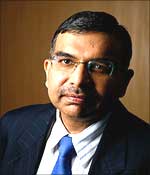 | « Back to article | Print this article |
 Soaps-to-software major Wipro sees an environment for positive demand and broad-based growth across all verticals, service lines and geographies.
Soaps-to-software major Wipro sees an environment for positive demand and broad-based growth across all verticals, service lines and geographies.
In an interview with Mahesh Kulkarni and Archana Prasanna, joint chief executive officer Girish Paranjpe says the company expects uniform growth in information technology spends, despite flat to marginally positive IT budgets in 2010. Edited excerpts:
You have said IT budgets are going to be flat to marginally positive in 2010. What impact will it have on your business?
It is possible for people to reprioritise how they spend their budgets. Services are relatively 20 per cent of their budgets.
They can cut back on hardware and spend more on services, they can choose to spend more on companies like Wipro. So, there is still a way they can spend more on us without necessarily busting their budgets.
What are your prospects in 2010?
There are two factors we have to understand. First is the composition of the budget and how much will get spent on hardware and software and IT services.
Budgets are going to be finalised in the next four to six weeks and we will know exactly what is going to happen for the next year.
However, the good news for 2010 is that, unlike last year where people were in a wait and watch mode and not spending money till much later in the year, this year people are ready to go right from the beginning.
So, we will hopefully have uniform growth in IT spending throughout the year.
What kind of growth can be expected for the industry next year?
We don't make forward-looking projections for the next financial year. But, as Nasscom has projected, we can expect a growth of anywhere between 14 and 15 per cent for the industry in the next financial year.
Do you see any signs of non-discretionary spending?
This is still the beginning of the year and budgets are just getting approved. At this point, most of the companies will not spend anything outside their budget. What they have is special approval for spending on programmes like acquisition, integration, etc. But otherwise, everybody is working within budgets.
What are the growth areas for you in the quarter and the coming financial year?
As of now, it looks like everybody is in a mood to spend. And that's what we saw during the third quarter. . . The growth was completely broad-based. It was not restricted to a few clients, geographies or verticals.
Even people who had suffered a lot in 2009 saw strong growth in the third quarter. At this moment, it looks fairly good for everybody, but we cannot make projections for the next fiscal.
Your price realisation has gone down sequentially. Do you see any drop in bill rates?
That has not changed. Billing rates are stable. There has not been any kind of a decline in rates during the third quarter.
Foreign exchange was marginally impacted. Also, there has not been much change in our earnings due to the rupee appreciation.
But we will have to see what happens in the current quarter (January-March 2010), as the rupee has strengthened.
Our margins were flat at 23.8 per cent. It was the same in the previous quarter. And, we said it was largely driven by the fact that we had a fewer number of working days. So, there was some impact on bill rates.
How sustainable is the recovery, especially in the banking, financial services and insurance segment?
The recovery is more secular. In financial services, we have seen a fairly strong growth in this quarter at almost 6 per cent.
Two or three factors are driving growth. What's most talked about is the IT activity, driven by mergers and acquisitions, which have happened in the banking sector. But that doesn't necessarily cover the entire banking.
It's limited to about 10-15 per cent of banking. There are other drivers for the sector as a whole. We will have to refresh products and services and relaunch them.
The second thing that is driving growth is a host of regulations, which are expected to encourage companies to up compliance in most of the developed countries.
The third factor is that these banks also have to increase their footprint and address emerging markets. The banks are going to create long-term revenue streams.
What are the opportunities in government business and healthcare sectors?
We always had a strong focus on these sectors in India. In fact, we are creating and investing in a separate organisation to address the opportunities here.
Outside, we are much more selective because, sometimes, governments can be fairly restrictive about who can serve them. So, we have picked areas where we have expertise and governments are open to seek help from us.
So, there are markets in Asia and Australia as well as in Europe where we think we have a good chance of working on government projects.
In the US, specifically, we have a local company that does work for the government in the healthcare area. We intend to leverage more and invest more in other areas.
Image: Girish Paranjpe